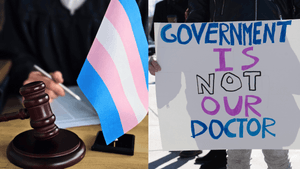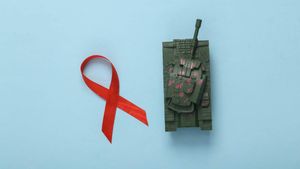It’s sad that even as adults, rumors and preconceptions often keep us from taking risks in our careers and personal lives. For most HIV-positive people, disclosing their status in a new relationship is met with anxiety and panic: Are they going to run away the second they know I’m HIV-positive? Or worse: Are they going to stop loving me?
The truth is it’s not HIV that ruins a perfectly great relationship, but rather the stigma both parties attach to it. In today’s world, people who are poz and on treatment can become undetectable (meaning, they suppress the virus to such low levels that it’s impossible to transmit). On the same note, those who are HIV-negative can practice safer sex with condoms while also practicing PrEP (a daily pill strategy that when taken properly makes it virtually impossible to contract the virus).
So, the question of how to thrive in a serodiscordant relationship — when one partner is poz and the other isn’t — hardly involves HIV at all, or at least it shouldn’t. Science has advanced beyond that reach, but that’s not to say HIV will never be a player in the relationship. It will be. The same goes for any condition you or your partner may have, be it diabetes, cancer, or resting bitch face.
The conundrum is that not everyone is up to speed on proper education (not even some doctors). When some folks here the word “HIV,” they draw from stigma of decades past and are likely to assume that sex will never be safe; therefore the relationship will never work out.
Well I’m here to call bullshit.
I am HIV-negative and have dated folks who are poz. Quite often we fought about it and were hung up about what our friends might be saying about us, yet through it all we used these challenges as opportunities to educate them — and ourselves. At the end of the day, we realized much of the dark cloud we held over the relationship had nothing to do with us, or HIV. It was the stigma both he and I still carried about it. And that was on us. Once we got over that, then came the process of self-care and monitering.
HIV stigma runs deep in our culture. It’s one of the only health conditions that welcome judgment from a larger population. It is not like dating someone with diabetes because there is an added social pressure. The world doesn’t tell you you’re going to “catch” diabetes. (By the way, I also dated someone with diabetes, and our self-care practices were the same)
As a result of this kind of judgment, many people in serodiscordant relationships choose to keep their statuses private, which means people like my ex and me (it was our first time in a serodiscordant relationship) didn’t have examples to show how to deal with HIV's unique challenges. We had to figure it out for ourselves.
The number one rule in any relationship is accountability. When dating someone of the opposite status, this rule becomes crucial. Like any other chronic health condition, there is a certain amount of self-care involved that works both ways when in a long-term relationship. When you care about your partner, their health becomes just as much a part of you as it does to them. And that happens naturally.
It’s ok to be overly solicitous towards your poz partner, putting a little too much emphasis on treatment adherence — so long as you don’t neglect aspects of the relationship as a whole, like listening, validating, affirming, laughing, and my favorite: dancing in the kitchen (it never fails to brighten one's day). Use your words. Don't let them only see the critical side of you, but speak with them about your concerns and why you might come across as overprotective.
For those who are poz, yes, it’s normal to be overly cautious about your partner’s health and be worrisome about transmitting the virus to them — but don’t internalize it into shame, guilt, fear, regret, and self-loathing. At the end of the day, you love each other. That is enough. Have an open line of communication about preventative measures, without neglecting your own health.
HIV medication can be unpleasant on the body at times, which can trigger arguments and perhaps a lack of physical intimacy altogether. Trust me, it’s important to work through it and make sure the emotional and mental infrastructure is in place before chastising each other because of it.
I know that sometimes HIV will feel like a third partner in your relationship (or in some cases, that annoying mother-in-law who can’t stop criticizing you), but if you look at it objectively it’s just another hurdle. You’re dating a person, not their status. When the person is worth it, health conditions become another obstacle that slowly disappears in the grand scheme of things.
Knowledge is your best friend. You can’t argue with undetectable. You can’t argue with PrEP. These are facts and tools that can be relied on. Never let anxiety or fear take away what should be one of the most beautiful things life has to offer... them.
David Artavia is the managing editor at The Advocate magazine, Plus magazine, HollywoodHoller.com; and the features editor at Chill magazine. Follow him on Facebook: @TheDavidArtavia. Twitter: @DMArtavia. Instagram: @DMArtavia






































































